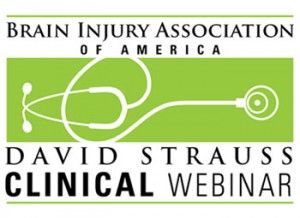2024.09.19 – Rediscovering Intimacy after Brain Injury (Recorded Webinar)
A David Strauss Memorial Clinical Lecture recorded webinar featuring Angelle Sander, Ph.D.
To download the webinar, choose the “Download Now” option from the dropdown below. After completing the checkout process, you will receive an email with further instructions and a file that includes information about receiving your ACBIS CEU.
Aired live on September 19, 2024. Includes 1 ACBIS CEU.
Note: A certificate of attendance/ACBIS CEU certificate will not be available with the purchase of this webinar after September 30, 2027.
In this David Strauss Clinical webinar, Angelle Sander, Ph.D., describse the impact of brain injury on intimate relationships, including physical and emotional intimacy. Potential reasons for reduced intimacy are described, as well as recommendations for improving intimacy.
Learning Objectives:
- Describe two ways in which brain injury can disrupt physical and/or emotional intimacy.
- Name two potential causes of reduced intimacy.
- Explain two methods for improving intimacy after brain injury.
Includes 1 ACBIS CEU.
Speaker Bio
Angelle M. Sander, Ph.D., is a Professor in the H. Ben Taub Department of Physical Medicine and Rehabilitation at Baylor College of Medicine and Director of TIRR Memorial Hermann’s Brain Injury Research Center and Senior Scientist on the TIRR Research Council. She is Project Director for the TIRR Memorial Hermann/Baylor College of Medicine/UThealth Collaborative Traumatic Brain Injury Model System. She has been PI or Co-Investigator on federally funded studies addressing prediction and treatment of cognitive, emotional, and psychosocial problems in persons with TBI, self-management of TBI-related consequences, health literacy in individuals with TBI, intimacy and sexuality after TBI, impact of TBI on caregivers, and social determinants of health following TBI. She has over 140 peer-reviewed publications, numerous book chapters and published abstracts, and multiple consumer-oriented dissemination products, including fact sheets, educational manuals, webcasts, and videos targeted toward individuals with TBI, their care partners, and rehabilitation professionals.


